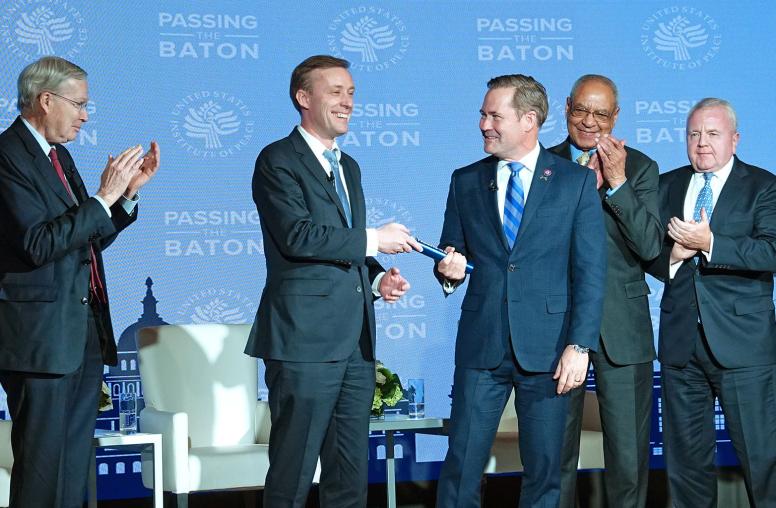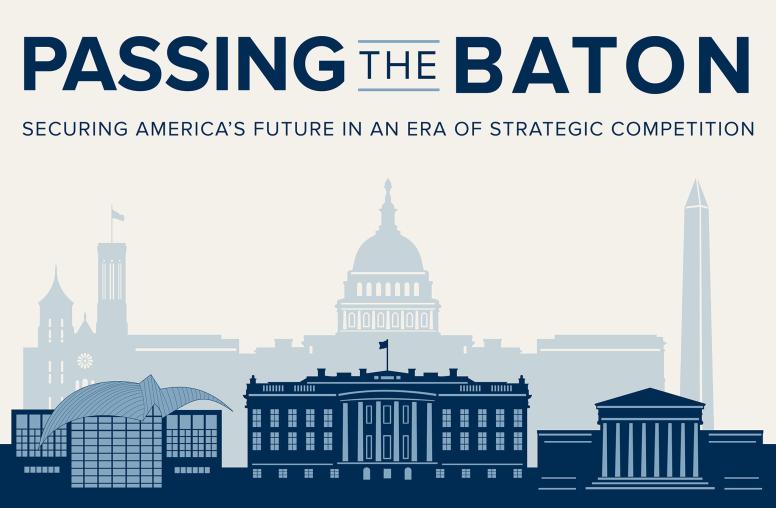Refugee Crisis Illustrates Need to Redouble Middle East Efforts, Experts Say
USIP Helps Lead Atlantic Council’s Middle East Strategy Task Force

For Immediate Release: Sep. 18, 2015
Contact:
Diane Zeleny
202-429-3869 (o)
Former Secretary of State Madeleine Albright and former National Security Advisor Stephen J. Hadley joined other speakers at the U.S. Institute of Peace today in denouncing the political failures that have led to the current refugee crisis in Europe. The two former officials, who lead the Atlantic Council’s Middle East Strategy Task Force, urged intensified efforts not only to improve the condition of people forced from their homes by war but also to resolve the conflicts themselves.
Hadley, the chairman of USIP’s board, moderated a discussion that included Albright, USIP President Nancy Lindborg, former U.K. Foreign Secretary David Miliband and Mayor Antoine Frem of the city of Jounieh in Lebanon, a country that has taken in 1.2 million refugees from the war in Syria, making up fully a quarter of the population. Frem noted that the proportion would be the equivalent of the U.S. taking in 90 million refugees.
The discussion, co-sponsored by the Atlantic Council and USIP, focused on how the United States and its partners should respond to the European refugee crisis. Lindborg noted that U.N. figures show 60 million people are displaced worldwide due to wars, conflict and persecution. The U.N. refugee agency ranks it as the greatest displacement of people since World War II. Speakers at today’s discussion noted that the roots of the current crisis in Europe run back to the conflict zones in the Middle East and Africa.
“Recent events have proven once and for all that the destruction of whole societies in the Middle East is not a regional problem, but a global crisis,” Albright said. “And it is a crisis that is not only a humanitarian emergency, but also a political emergency. It is a series of political failures that have led to the grave situation that we find today.”
The European conundrum over how to deal with the flood of some half million refugees arriving at their borders helps “refocus attention, resources and energy to address these critical issues in the region that is really at the roots of the crisis,” said Lindborg, who just returned from a visit to Iraq, where the Kurdish region has been overwhelmed by fully half of the 3 million Iraqis who fled their home in the past year’s onslaught of the self-styled Islamic State extremist group. Displaced Iraqis now make up a quarter of the Kurdish region’s population.
Today’s event was the third public hearing of the Middle East Strategy Task Force, a bipartisan Atlantic Council initiative that includes USIP and other institutions. It aims to develop a long-term framework for U.S. policy in the broader Middle East to support a stable, prosperous order based on resilient, legitimate, well-governed states.
Lindborg is a senior advisor to the task force. Manal Omar, USIP’s acting vice president for the Middle East and Africa, is convener of the task force working group on Rebuilding Societies: Refugees, Recovery, and Reconciliation in Times of Conflict. Elie Abouaoun, director of USIP’s Middle East programs, is co-convener of that working group.
Omar, an American with Palestinian roots, told of her parents’ journey through five countries “in search of a better life” and of growing up in an environment “where displacement and a thirst for a home was part of our daily life.” “It’s time for the donor community – and we’d like to also include the GCC (Gulf Cooperation Council) countries, the European Union and the United States – to make courageous political decisions. One is by making the clear commitment to refugee burden sharing, making a long-term commitment to supporting people’s resilience, with an acknowledgement that humanitarian aid in the short-term alone will not [suffice].”
Miliband, the son of refugees who now serves as president and CEO of the International Rescue Committee and also is a senior advisor to the task force, focused along with the other panelists on steps needed to address the crisis at its roots -- the wars, poverty and failures of governance that have uprooted 19 million people across the Middle East and North Africa.
The immediate crisis is not only massive, but long-term, panelists said. The United States and its partners should begin immediately the groundwork for a transformation in the Middle East that can halt the dislocation at its sources.
A video recording of the event, including Omar’s outlining of her working group’s findings, will be available here. Lindborg laid out her observations in a commentary published today on the Peace Channel, a joint initiative with USIP on ForeignPolicy.com. For more information on the Middle East Strategy Task Force, see the home page.
To request interviews with USIP experts, please contact Diane Zeleny, 202-429-3869.
And continue the conversation on Twitter with #BeyondRefugees and #ACMEST.



